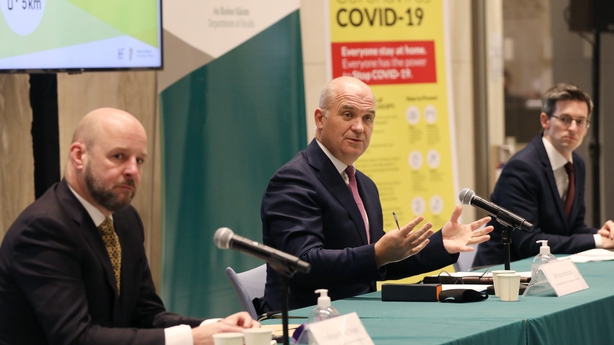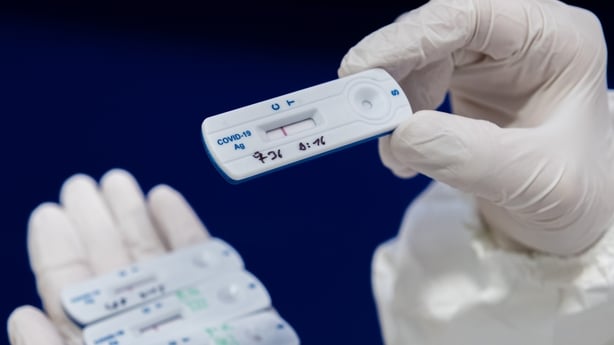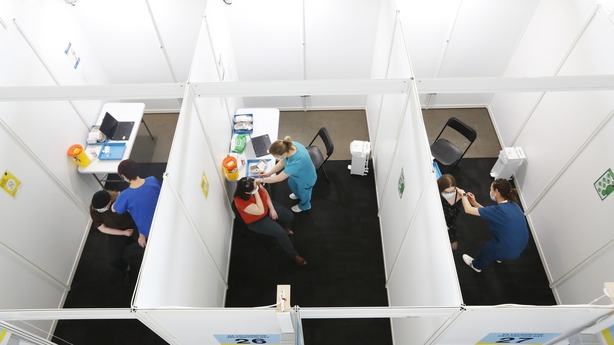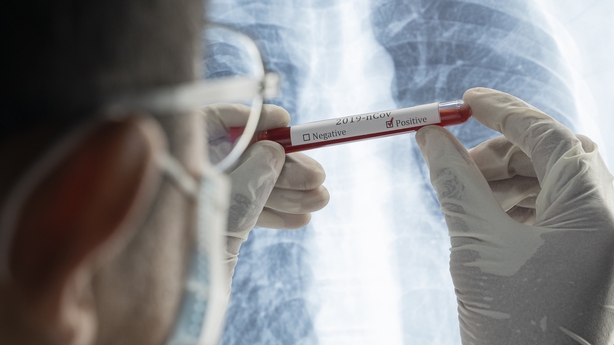When the dust from the coronavirus crisis is finally over here, there will be time to reflect on exactly what happened and how it was handled by the government and various authorities.
The government has already indicated that there will be an investigation of some kind. One possible example is the Banking Crisis Investigation Commission, which was a joint committee of the Oireachtas.
As with dealing with any major crisis, there will be successes and failures as well.
The virus was a unique and unprecedented event. However, all health authorities were supposed to have plans for epidemics. Sure enough, the events of the past year and a half have tested them and people.
Unlike normal, we had to face the big test first, lessons to come later.
We had a sense of what a parliamentary inquiry might look like, this week in particular, with evidence in Westminster by Dominic Cummings, a former advisor to the British prime minister, and other people.
At this point, it allows us to get a first look at some of the apparent differences and similarities between the Irish and the UK’s approach to the pandemic.
A complete lockout
Who will ever forget the lines: “I want to talk to you about the Coronavirus,” delivered from Washington by Taoiseach Leo Varadkar on March 12, 2020.
The closure came hard and fast, with schools, colleges and childcare facilities closed. Large indoor and outdoor gatherings have been canceled.
People were asked to work from home wherever possible. The measures went into effect at 6 pm that day. And the rest, we’re all very familiar. It was nice, but the national mood was dark.
This approach contrasts starkly with the position on lockdown in the UK. In testimony to the UK investigation this week, Dominic Cummings painted a picture of the government there opposing the lockdown, over fears it would destroy the economy and people.
There has also been an opinion within some of the scientific community advising the UK government that modeling the virus allowed time to think about what needs to be done. The «peak» was expected around June.
So, while Ireland decided to shut it down severely early, Britain delayed it and other important measures for a few weeks, with dire consequences.
According to Mr. Cummings, tens of thousands of people died, and they didn’t need to.
The day after the Taoiseach spoke to the country here in Washington, in the UK, there were some big concerns. According to Cummings’ evidence, on Friday, March 13th last year, former Deputy Cabinet Secretary Helen McNamara warned a room of senior officials, «We are in trouble.»
Cummings also noted that if the UK did not eventually close its doors, the truth was that people would close their homes out of fear, especially since the NHS would not be able to cope, and pictures of what was happening in northern Italy were terrifying.
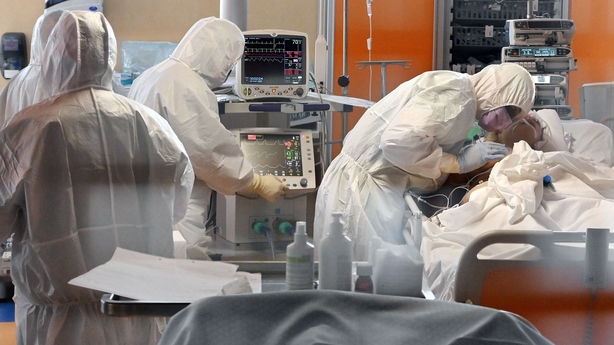
Flattening the curve
The idea behind the shutdown here was to suppress the virus, prevent it from taking off or flattening the curve. This is clearly very different from the «let it split» approach and achieve herd immunity.
When Leo Varadkar made his remarks on March 12th, the National Public Health Emergency Team just warned that “in recent days there has been a significant increase in the number of cases detected in Ireland, the number of clusters in hospitals with some cases in intensive care and a number of cases emerging. On community transmission. «
Additional measures Ireland introduced to flatten the curve included self-isolating people with symptoms, reducing social contacts and requiring elderly people to stay home as much as possible.
In Britain, bars and restaurants remain open, particularly the Cheltenham Racing Festival.
The UK approach appears to have been based on the view that lockdown is not possible and suppressing the virus will only delay an inevitable peak at a later date. This has been described as a catastrophic mistake.

NPHET vs. SAGE
Here the National Public Health Emergency Team (NPHET) was established on January 27, 2020. And arguably, it’s now better known than Bono, Katie Taylor or Liam Neeson.
In Britain, the equivalent body was the Emergencies Scientific Advisory Group (SAGE). It is also known now, but has come under heavy criticism from medical experts and outside scientists.
NPHET here and some of its key members have become important public figures. There have been regular weekly or even bi-monthly briefings, streamed to anyone wishing to view the proceedings.
Journalists from the major print and broadcast media attended, posed questions and explored the ideas behind the decisions. Often there were more questions than journalists to ask and limited time for questions per media representative.
Some members of the public felt the media’s questioning was not aggressive or investigative enough. People have also been divided about NPHET, its logic, its approach and in fact the many answers that its members have given.
It has also been attacked by some outside medical and scientific figures.
But NPHET briefings were public. There were uncomfortable moments for Chief Physician Tony Holohan and other members, and the minutes of the NPHET meetings were released, albeit with some delay.
The last minutes posted on the Ministry of Health website are April 15, 2021. In Ireland, NPHET advice to the government is published a week or two after the government receives it.
By comparison, SAGE is seen in the UK as classified. There was also Downing Street Advisors on it.
This week, Dominic Cummings said he believed the modeling system he used should have been rolled out, so the public could analyze it.
In April of last year, there was criticism that SAGE’s membership and advice it provided to the government had been kept confidential.
In June 2020, SAGE published the scientific evidence supporting the government’s response to the coronavirus.
According to SAGE: «Evidence has often been complied with very quickly during a fast-moving response and must be viewed in this context. The papers presented here are the best evaluation of the evidence at the time of writing, and their conclusions on this are formed on the basis.»
SAGE has posted updated materials since then, along with meeting minutes. Another body, Independent SAGE, was created by people unhappy with the UK’s approach.
One participant is public health expert Dr. Gabriel Scully, known here for his diverse investigative work.
The independent SAGE system was created to provide a general analysis of the Coronavirus because it saw the UK government body being either too slow or failing to provide its analysis behind certain decisions.
Antigen test
There has been a lot of controversy here about the slow spread of Covid-19 rapid and antigen tests. The expert group set up by the government was in favor of wide use but there was a split in the group and could only publish the majority report.
Much of the opposition to antigen testing is due to concerns about the accuracy of the tests and how people might interpret them. But the business community sees antigen testing as a way to help re-open society.
Questions have been raised about whether NPHET’s reluctance to support the general use of antigen tests is also due to a desire to control the test and keep it in the hands of the health services, in order to fully maintain the spread of the disease.
We have seen disagreements on this issue between ministers and public health officials over the use of antigen tests.
Ireland is not alone. Dominic Cummings presented evidence this week about the perceived reluctance of UK authorities to adopt antigen testing as well.
This contrasts with the European Union’s position in support of the wider use of antigen testing. In fact, under the European Union’s rules on the European Union’s new digital Covid certification, results of a rapid antigen test can be used, once they are included in the list of acceptable rapid antigen tests.
Beginning of vaccination
Ireland is now in a better position with the introduction of vaccination than it was a few months ago, when there was a lot of criticism about what was perceived as slowing down.
But there are still concerns about the promised supply of a single dose of Johnson & Johnson vaccine as well as further delays in using the AstraZeneca vaccine.
Notably, Health Secretary Stephen Donnelly this week told the Dale that it was unclear whether the goal of administering the first vaccine for 82% of all adults here will be met by the end of June.
The official position is that if he misses it, it will be in a matter of weeks.
In comparison, the UK’s success with its vaccination program is remarkable. Observers believe this may also reduce the severity of Boris Johnson’s criticism of the ongoing investigation in the UK.
Of course, the UK had the lead in vaccinating and gaining access to the AstraZeneca vaccine, which was developed in the UK, with the help of the University of Oxford.
The first dose taken in the UK was the Pfizer-BioNTech vaccine on December 8 last year. Here the first dose was given on December 29. Ireland has also been hit hard by delivery delays.
HSE dodged a large bullet in recent weeks, given that the cyber attack did not enter into the separate vaccination scoring and management system. It would have been a disaster.
Personal protective equipment
Both Ireland and Britain had major problems in the early stages of securing adequate personal protective equipment for health workers. Ventilation devices were also in great demand.
Here, I have been contacted by a number of companies that want to supply PPE and other items to health, safety and environment. Some companies felt that they could not get anywhere due to too much bureaucracy or red tape or too many agencies to deal with in order to get a final decision.
From a health, safety and environmental perspective, it was essential to ensure that all materials and equipment met certain standards.
In Britain, it appears that the Ministry of Health has rejected ventilators as the price has risen. They also wanted to ship PPE instead of getting it faster by plane, as shipping was the old system that had been tried and tested for years.
Obviously, we still have to hear all the evidence from the UK investigation and then go through the final report before getting a full picture.
Here, it may take some time before any investigation into Covid-19 begins.
There will be many questions. But as noted this week, even the best minds in the world would not have dealt with the coronavirus pandemic. Hindsight is useful but also flawed.
However, serious lessons must be learned about how we deal with this epidemic, so that there are fewer deaths and diseases, and less damage to society, if or when another comes.
Summer is coming, with a sweep of light, to burn the darkness that we all felt, in our different ways.
We traveled together and did alone too.
But we must also learn the lessons of this historic period for the benefit of future generations.
So people can be more prepared, anytime the next pandemic comes.
I think you’ll agree that a pandemic is a once in a lifetime, often once.

«Lector profesional. Jugador galardonado. Aficionado a los zombis. Adicto a las redes sociales. Experto en tocino. Erudito en Internet»
